Professor: Susan Rodger (lectures)
|
|
Graduate TA: Hieu Bui
|
|
Graduate TA: Yan Chen
|
|
HEAD Undergraduate TAs (UTAs)
- William Broughton
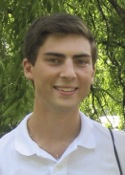
- Evan Kaplan
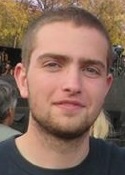
- Jie Wang
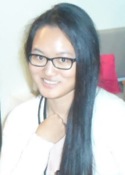
All Undergraduate TAs (UTAs)
See the names and pictures of the rest of the UTAs here.Course Meeting Time
Lecture:
|
SEC 001: Tuesday and Thursday White Lecture 107 10:05am-11:20am |
|
|
|
|
|
SEC 002: Tuesday and Thursday LSRC B101 1:25pm-2:40pm |
|
Lab:
| Section | Time | Place | Leaders |
|---|---|---|---|
| 11 | Wed 11:45-1:00pm | LSRC A156 | Nicole Wong, Sung-Hoon Kim, Monica Choe |
| 12 | Wed 11:45-1:00pm | Allen 103 | Yossra Hamid, Rica Zhang, Jie Wang |
| 01 | Wed 1:25-2:40pm | Languages 109 | Samantha Huerta, Abby Hoffman |
| 02 | Wed 1:25-2:40pm | LSRC A156 | Kannan Raju, Elizabeth Onstwedder |
| 03 | Wed 3:05-4:20pm | Bio Sci 063 | Bohan Lin, Sakura Takahashi |
| 04 | Wed 3:05-4:20pm | Bio Sci 113 | Yijun Li, Elizabeth Dowd, Julie Hong |
| 13 | Wed 3:05-4:20pm | North Building 311 | Evan Kaplan |
| 05 | Wed 4:40-5:55pm | Old Chem 123 | Jenny Kuo, John LeBeau |
| 06 | Wed 4:40-5:55pm | Soc Sci 228 | Isabelle Clark, Alex Simko |
| 14 | Wed 4:40-5:55pm | LSRC D243 | Victor Liao, Elizabeth Dowd |
| 07 | Thur 3:05-4:20pm | Soc Sci 311 | Ethan Levine, Sung-Hoon Kim |
| 08 | Thur 3:05-4:20pm | Old Chem 123 | Eshita Singh, Wesley Valentine |
| 09 | Thur 4:40-5:55pm | Old Chem 123 | Alex Park, Jimmy Fang, Leanna Zhan |
| 10 | Thur 4:40-5:55pm | Soc Science 228 | Nick Strelke, Eshita Singh, Monica Choe |
You should be signed up for one lab. Labs are on Wednesdays and Thursdays. Labs start the first week of classes.
Text (Required)
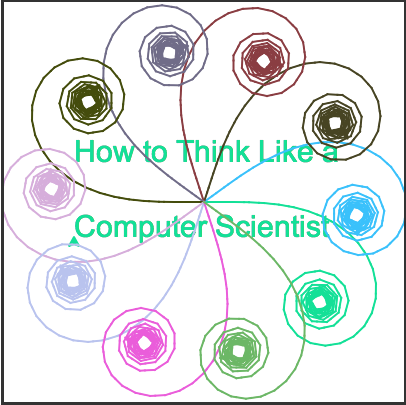
How To Think Like a Computer Scientist - Learning with Python: Interactive Edition 2.0
by Jeffrey Elkner, Allen B. Downey, and Chris Meyer
How to get the book:
- This book is an electronic book and is free, however, please note that I
could have assigned a $150 textbook, but I didn't (Whew!). However, it costs money to run
the server for this electronic book.
This book will allow you to experiment with python examples right in the
book.
Please give them a donation to help support the book, I'd suggest $15 . - You will need to sign up for a free account and use a specific code to get our version of the book. Look on the Sakai site under announcements for the code to use.
Text (Optional, Recommended)
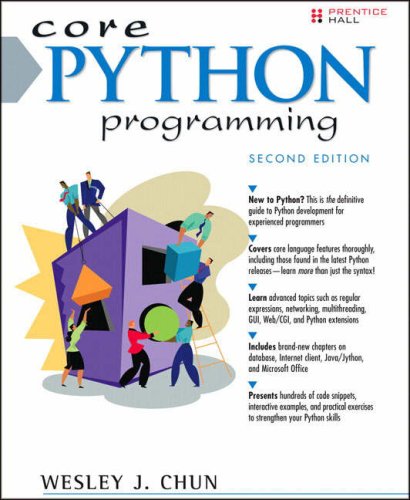
Core Python
by Wesley Chun Ranum
This book is not free, but would give you additional perspective on topics.
Reading
All assigned reading is from the "How to Think" book and will be posted on the calendar page for each lecture. In general you should read the text in order to be prepared to ask and answer questions in class. If you've looked at material before it's discussed in class you'll get much more out of the class discussion. This is especially true once class has been going for a while.
There may be either reading or knowledge quizes on Sakai due at 10am on the day of lecture. They will be listed on the calendar page if there is one due. Quizzes on Sakai must be completed by 10AM on the day of lecture, they won't be available anymore after that.
Web page
Many of the materials for this course (including this page) are available on http://www.cs.duke.edu/courses/fall14/compsci101/Bulletin Board
We will use Piazza for the class bulletin board. Look here for announcements, hints, and information relevant to this class. You can also post questions here. You should check this page at least once a day!
Lecture and Classwork
Class attendence is required. We will work on problem solving (with and without computers) during lecture. We will sometimes submit answers electronically during lecture. Bring a laptop to class if you have one.
Labs
In addition to the lecture, you should be signed up for a lab that
meets once a week. Attendance is required in lab. We
will work on problem solving in groups during labs. We will submit answers
electronically during lab. Bring a laptop to lab if you have one.
Submit each week's lab worksheet, either individually or as part of a team
of up to four, by the end of the day on which you attend lab - lab work
cannot be made up later.
One lab during the semester can be missed with no penalty.
If you cannot attend your lab section in a given week, you are expected to
still complete the material on your own and submit the lab worksheet by the end
of day on Sunday of that week for partial credit. No lab submissions will
be accepted after Sunday. It is important to do each lab as they provide
practice for the concepts you will be learning.
You will work in teams of up to four during lab and at least one person
from each team must bring a laptop to lab each week. When working in a
team, if you were not there or your team determines that you did not
participate in the exercises, your name should not be included on the final
submission. Your lab work will be graded on a 4 point scale and
based on how complete the answers are on the form (absent, there in body
only, clear effort, good and complete answers).
Computing projects
Beside labs, there are two types of computing projects you will turn in (assignments and apts). All computing projects should be done individually unless otherwise stated and will use Python, the Eclipse environment and Ambient for submitting. See the Resources page for information about installing these.All computing projects should include your name and your netID as a comment in the program and a separate README text file that gives information including your name, your netID, how long it took to work on the project, anyone you received help from, and any other information required for that specific project.
LATE POLICY: Projects turned in on time receive no penalty. Note that 1 minute late is late! Each student is granted two extensions of three school days with no penalty during the semester. Project extensions will be determined automatically. If your program is submitted one minute late, you just used one of your two extensions. Unused extensions are worth one point each at the end of the semester.
Projects can be submitted up to one week late for half credit. All projects must be received before the last day of class regardless of any extension.
If you find yourself using your first extension early in the semester, you need to start working on your programming projects earlier and possibly seeking help earlier.
See Prof. Rodger immediately if you are having difficulty with this class.
Collaboration
First, you should follow the Duke Community Standard.Second, unless otherwise stated, all work in this course should be your own work.The Duke Community Standard Duke University is a community dedicated to scholarship, leadership, and service and to the principles of honesty, fairness, respect, and accountability. Citizens of this community commit to reflect upon and uphold these principles in all academic and non-academic endeavors, and to protect and promote a culture of integrity.
To uphold the Duke Community Standard:
- I will not lie, cheat, or steal in my academic endeavors;
- I will conduct myself honorably in all my endeavors; and
- I will act if the Standard is compromised.
You can get help from professors, the graduate TA and the undergraduate UTAs associated with the course.
You may consult with other students in the course but you should not share code with other students. Consult means you can discuss the project before writing it, and get help with debugging your project, but you should write your own code. Writing a program and sending copies to another student is not acceptable! For each assignment you are expected to include a list of the people with whom you have consulted (including students, TA's, tutors, professors).
You should not search the internet for code solutions, nor ask for help on internet sites, with the one exception of the Piazza site for this course. On the piazza site, you should not post your program and ask for help, but instead describe the error you are getting best you can or post the error message and 1-2 lines of code where you are getting the error message.
Tests must be your own work.
Grading
| labs | 10% |
| quizzes(reading or knowledge)/classwork | 10% |
| apts | 10% |
| assignments | 20% |
| two exams | 25% |
| final exam | 25% |
Grading is done on an absolute, but adjustable scale. This means that there is no curve. Anyone earning 90% or more of the total number of points available will receive a grade in the A range (A+,A,A-); 80% = B, 70% = C, 60% = D. This scale may go down, but it will not go up.
Extra credit in a category is applied to that category. Extra credit on APTs are applied to the APT category. You may not receive more than 100% in any category. However, extra credit that tops you over a category (more than 100%) is noted and will be considered when calculating final grades if you are close to a border.
The tests and final exam will be closed-book.
FINAL EXAMS:
- SECTION 001 (lecture meets Tues/Thur 10:05am)
Your FINAL EXAM is SATURDAY, DECEMBER 13, 2014. 2-5PM - SECTION 002 (lecture meets Tue/Thur 1:25pm)
Your FINAL EXAM is WEDNESDAY, DECEMBER 10, 2014. 7-10PM
Course Web Sites
We will use several course web sites for this course.
- CompSci 101 Course web site
The syllabus, class notes, readings, assignments, apts, labs and other resources are available here. - Sakai
Grades, reading/knowledge quizzes and announcements will be here. - Runestone Interactive Books (gmail or facebook login required)
The course textbook is online and interactive! It includes practice exercises that we may assign during the semester. - APT site APT Problems will be hosted at this site.
- WebSubmit (standard Duke NetID required)
The place to submit your programming projects. Note, this site is an alternative to using Eclipse directly. - Piazza Discussion Board (standard Duke NetID required)
If you have any questions about the course, post your questions here because it is seen by all the course staff as well as all the students. - Python Tutor (no log in required)
This site is used within the textbook and sometimes during class. It is a useful tool for seeing exactly what your program is doing when it is run. Additionally, although not its primary purpose, you may want to paste your code there to help debug more complex issues --- always make sure your most current version is saved on your computer within Eclipse.